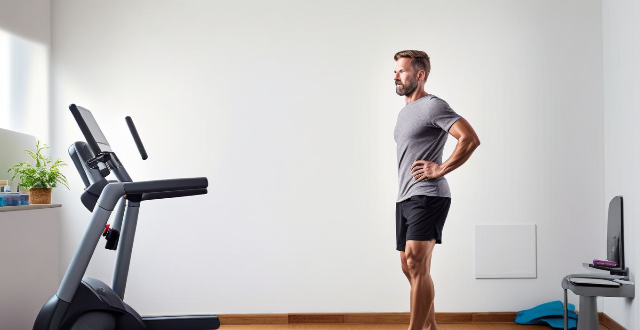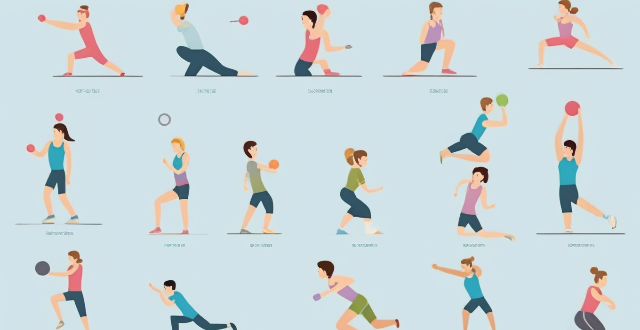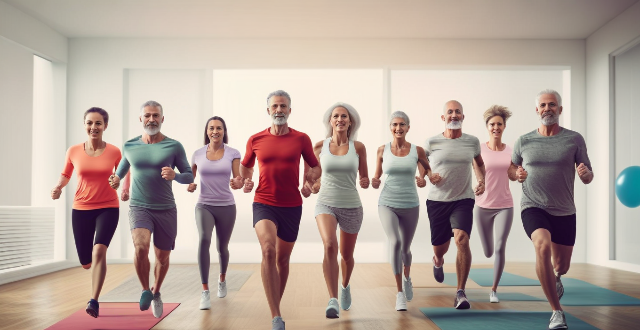Exercise Effects

How does exercise physiology contribute to understanding the aging process and its effects on physical performance ?
Aging is a complex biological process that affects all living organisms, involving a gradual decline in physical and mental functions over time. Exercise physiology, the study of how the body responds to exercise, plays a crucial role in understanding the aging process and its effects on physical performance. As we age, our muscle mass and strength tend to decrease, cardiovascular fitness reduces, and joint pain and stiffness become more common. Exercise physiology helps us understand how the body adapts to regular physical activity at different stages of life, preventing age-related declines and promoting healthy aging through targeted exercise programs.

Is there a relationship between exercise and cognitive function ?
Exercise is a potential intervention for enhancing cognitive function across the lifespan. The relationship between exercise and cognitive function is complex and multifaceted, involving various aspects of cognition and different types of exercise. Long-term exercise interventions have consistently shown positive effects on cognitive function, particularly in older adults. Different types of exercise may influence specific cognitive functions differently, and the underlying mechanisms behind these effects are still being explored. By incorporating regular physical activity into our daily routines, we can potentially enhance our cognitive function and overall well-being.

Does exercise have different effects on cognitive function at different ages ?
This article explores the relationship between exercise and cognitive function across various age groups. It highlights the benefits of exercise for children's cognitive development, adults' reduced risk of cognitive decline, and older adults' slowed cognitive decline. Examples of suitable exercises for each age group are provided, including playing sports for children, aerobic activities for adults, and walking or cycling for older adults. The article concludes that incorporating physical activity into daily routines at any age is crucial for maintaining cognitive health and overall well-being.

What are the long-term effects of consistent exercise on mental health ?
Consistent exercise has a multitude of long-term effects on mental health, including improved mood, reduced anxiety and stress, better sleep, increased self-esteem, enhanced cognitive function, and social interaction. These benefits make regular physical activity a powerful tool in maintaining good mental health.

Are there any particular sports or exercises that have been studied for their impact on immunity ?
This article discusses the impact of various sports and exercises on immunity, including aerobic exercise, resistance training, high-intensity interval training (HIIT), and yoga/meditation. It highlights the positive effects of these activities on immune function when performed regularly and appropriately, such as increased blood flow, enhanced immune cell production, improved cardiovascular health, and reduced inflammation. However, it also emphasizes the potential negative effects of excessive exercise or overtraining on immunity, urging individuals to find a balance between physical activity and rest.

What are the long-term effects of youth sports on mental health ?
Youth sports can have both positive and negative effects on mental health, including increased self-esteem, improved social skills, and reduced stress levels. However, pressure to perform, overtraining, injuries, bullying, and dependence on sports for identity can also have negative impacts. It is important for adults involved in youth sports to be aware of these potential effects and take steps to foster the positive ones while mitigating any negative impacts.

What are the effects of pregnancy and motherhood on women's mental health ?
The article discusses the impact of pregnancy and motherhood on women's mental health, highlighting both positive and negative effects. Positive effects include increased responsibility, improved social support, and enhanced emotional connection with the child. Negative effects may involve postpartum depression, anxiety disorders, and trauma-related disorders. Coping strategies such as seeking professional help, building a support network, and practicing self-care are recommended to manage any mental health challenges that arise during this period.

Can taking sports nutrition supplements lead to health risks or side effects ?
Sports nutrition supplements can enhance performance and recovery but may pose health risks and side effects such as overdosing, contamination, interactions with medication, and allergic reactions. However, when used appropriately, they can also improve performance, increase muscle mass, aid in recovery, and replenish nutrients. It is crucial to research each supplement, follow recommended dosages, and consult with a healthcare professional to minimize risks and maximize benefits.

What are the most common side effects of vaccines ?
The most common side effects of vaccines are pain and swelling at the injection site, fever and chills, fatigue and headaches, and nausea and diarrhea. These symptoms are usually mild and last for a few days to a week. To manage these side effects, you can take over-the-counter pain relievers, apply ice packs, drink plenty of fluids, get enough sleep, and eat a healthy diet. If you experience severe side effects such as an allergic reaction or persistent symptoms, it is important to seek medical attention immediately.

Does exercise increase deep sleep ?
Exercise can increase deep sleep by promoting thermal downregulation and improving sleep efficiency over time. Regular exercise is recommended to enhance sleep quality, but timing is crucial to avoid sleep disruption.

How does exercise affect sleep patterns and quality ?
Exercise significantly influences sleep patterns and quality. Immediate effects include increased alertness and better body temperature regulation for sleep. Long-term, regular exercise improves sleep quality and regulates sleep patterns. Different types of exercise—aerobic, anaerobic, and mindful movements like yoga—all positively affect sleep but may require varying recovery times. The timing of exercise is crucial; morning workouts set the day's tone with minimal sleep interference, while late-night exercises can hinder sleep preparation. Tailoring workout routines to individual needs optimizes rest and overall well-being.

Can exercise help with stress management ?
**Topic:** Can Exercise Help with Stress Management? **Summary:** * **Introduction:** The inevitability of stress and its potential impact on health highlight the importance of effective stress management. Exercise is often touted as a beneficial method for reducing stress. * **Relationship Between Exercise and Stress:** * **Physical Effects:** Exercise triggers endorphins, reduces cortisol levels, and improves sleep quality—all of which contribute to stress reduction. * **Mental Effects:** Enhanced cognitive function, increased self-esteem, and mindfulness techniques associated with exercise can aid in stress management. * **Benefits of Exercise for Stress Management:** * **Physical Benefits:** Improved cardiovascular health, weight management, and pain relief can reduce stress caused by related health issues. * **Mental Benefits:** Exercise can alleviate symptoms of anxiety and depression, improve mood, and increase resilience to stress. * **Practical Tips:** * **Setting Goals:** Start small and choose enjoyable activities to make exercise a sustainable habit. * **Consistency:** Scheduling workouts, finding an accountability partner, and tracking progress can help maintain a regular exercise routine. * **Conclusion:** Exercise is a powerful tool for managing stress, offering both physical and mental benefits. Incorporating it into one's lifestyle can significantly enhance overall well-being and resilience to life's challenges.

Can diet and exercise affect memory according to scientific studies ?
Diet and exercise can positively impact memory, asDiet and exercise can positively impact memory, as a healthy lifestyle that promote cognitive while regular physical activity increases blood flow to the brain, reduces inflammation, and promotes the growth of new neurons. Conversely, a poor diet lacking in essential nutrients and lack of exercise can have negative effects on memory over time. Therefore, adopting a healthy lifestyle that includes a balanced diet and regular exercise is essential for maintaining good memory and overall brain health.

How does exercise improve cardiovascular health ?
This essay explores the ways in which exercise can improve cardiovascular health. It explains how regular physical activity strengthens the heart muscle, increases blood flow, and lowers blood pressure. The essay also discusses how exercise can reduce risk factors for cardiovascular disease, such as obesity, diabetes, and high cholesterol levels. Additionally, it highlights the positive effects of exercise on mental health and well-being, including stress reduction, depression management, and improved quality of life. Overall, the essay emphasizes the importance of regular exercise for a healthy lifestyle and encourages readers to incorporate physical activity into their daily routines.

How does exercise affect brain function and cognitive abilities ?
This article discusses how regular physical activity positively impacts brain function and cognitive abilities by improving blood flow, boosting neurotrophic factors, enhancing plasticity, and reducing inflammation. It emphasizes the importance of incorporating exercise into one's lifestyle for maintaining and enhancing cognitive health.

Can exercise reverse cognitive impairment caused by neurological disorders ?
Exercise may help reverse cognitive impairment caused by neurological disorders. Studies have shown that exercise can improve cognitive function in people with Alzheimer's disease, Parkinson's disease, and stroke. Exercise may also reduce inflammation, improve balance and mobility, and increase overall quality of life for people with neurological disorders. More research is needed to fully understand the effects of exercise on cognitive impairment caused by neurological disorders.

How does dehydration during exercise affect performance and physiological responses ?
Dehydration during exercise can significantly impact performance and physiological responses. It decreases blood volume, impairs thermoregulation, affects cognitive function, increases heart rate and blood pressure, causes respiratory alkalosis, leads to muscle cramping and stiffness, and alters metabolic processes. Athletes should stay hydrated to avoid these negative effects.

Can excessive exercise lead to sleep disorders ?
Overtraining can cause sleep disorders by disrupting normal sleep patterns and causing physical stress and fatigue. Relaxation techniques such as meditation, yoga, or deep breathing exercises can help calm your mind and body before bed. Adjusting your exercise routine and creating a consistent sleep schedule can also improve sleep quality. If you continue to experience sleep disturbances, consult with a healthcare professional for further evaluation and treatment.

Is it safe to exercise while taking immunosuppressant medications ?
Is it safe to exercise while taking immunosuppressant medications? This article explores the potential risks and benefits of exercising while taking immunosuppressant medications. While these drugs are essential for many people, they can also have side effects that may impact a person's ability to exercise safely. The primary concerns associated with exercising while taking immunosuppressant medications include an increased risk of infection, fatigue and weakness, and musculoskeletal issues. However, regular exercise has been shown to improve mental health, enhance immune function, and reduce the risk of chronic diseases. It is generally safe for individuals taking immunosuppressant medications to exercise, but they should take certain precautions to minimize their risk of infection and other potential complications.

How does exercise influence neuroplasticity and cognitive function ?
Exercise has a positive impact on neuroplasticity and cognitive function by increasing blood flow, releasing growth factors, reducing inflammation, improving attention and concentration, enhancing memory, and slowing cognitive decline. Incorporating regular physical activity into your lifestyle can have numerous benefits for your brain health and overall well-being.

How much exercise is needed to reduce anxiety and depression symptoms ?
Exercise has been shown to reduce anxiety and depression symptoms, with moderate-intensity aerobic exercise for at least 150 minutes per week being effective. However, individual factors such as age, gender, health condition, and lifestyle can affect the amount of exercise needed. It is important to choose enjoyable and sustainable activities for long-term use, and seek professional help if struggling with mental health issues.

Is there a difference in sleep quality between aerobic and anaerobic exercise ?
Both aerobic and anaerobic exercises can improve sleep quality, but aerobic exercises are more consistently associated with better sleep duration, efficiency, and latency. Anaerobic exercises may also have benefits for sleep quality, but it is important to manage any potential negative effects such as muscle soreness and fatigue.

What role does cardiovascular exercise play in managing daily stressors ?
Cardiovascular exercise is an excellent way to manage daily stressors, as it reduces the body's physiological response to stress and leads to improved mental and physical health. The benefits of cardiovascular exercise include reduced stress levels, improved sleep quality, increased energy levels, and better mental health. To get started with cardiovascular exercise, set goals, start slow, find activities you enjoy, and mix up your workouts. Incorporating cardiovascular exercise into your daily routine can help you manage stress and improve overall well-being.

Can exercise physiology help in managing stress and anxiety levels ?
Exercise physiology plays a significant role in managing stress and anxiety levels by promoting various physiological responses that counteract the negative effects of these conditions on the body. By incorporating regular physical activity into your lifestyle, you can improve your overall mental well-being and reduce the impact of stress and anxiety on your daily life.

Are certain durations or intensities of exercise more beneficial for cognition than others ?
Exercise has been shown to improve cognitive function, memory, and mental health. Both short-term and long-term exercise can enhance different aspects of cognition. Moderate-intensity exercise is most beneficial for older adults, while high-intensity exercise may also be advantageous but should not exceed certain levels. Aerobic exercise, resistance training, and balance exercises all contribute to cognitive improvement. Individual differences should be considered when determining the optimal exercise regimen for cognitive enhancement.

How does exercise influence hormone regulation in the body ?
Exercise affects hormone regulation in the body, impactingExercise affects hormone regulation in the body, impacting the intensity, duration, and impacting various hormones depending on the intensity, duration, and type of exercise. Regular exercise can increase testosterone levels in men and estrogen levels in women, reduce cortisol levels, and increase growth hormone levels. It can also improve insulin sensitivity and reduce insulin resistance, as well as maintain a healthy body fat distribution. However, excessive exercise or prolonged periods of intense training can have negative effects on hormone production and lead to low testosterone levels in men, low estrogen levels in women, high cortisol levels, low growth hormone levels, worsened insulin resistance, and decreased body fat distribution. Therefore, it is important to choose an appropriate type of exercise and maintain a balanced lifestyle for optimal hormone regulation and overall health.

Can music help reduce perceived exertion during exercise ?
Music can help reduce perceived exertion during exercise by positively influencing mood and cognition, and acting as a distraction from bodily symptoms associated with fatigue. Numerous studies have shown the benefits of music on perceived effort levels during workouts, but individual preferences and contextual factors play significant roles. To potentially benefit from reduced perceived exertion, it's important to select music that resonates personally and matches the intensity of your workout.

Can regular exercise prevent cognitive decline in older adults ?
Regular exercise may help prevent cognitive decline in older adults by promoting neuroplasticity, improving blood flow to the brain, and reducing inflammation. Multiple studies have found positive associations between physical activity and cognitive function in this age group. Guidelines recommend aerobic exercise, resistance training, and activities that improve flexibility and balance. Making exercise a regular part of daily life is key for maintaining cognitive benefits over time.

How does exercise impact memory and learning ?
Exercise has a positive impact on memory and learning by increasing blood flow, releasing neurotrophic factors, reducing inflammation, alleviating stress, and improving sleep quality. Incorporating physical activity into daily routine can enhance cognitive functions.